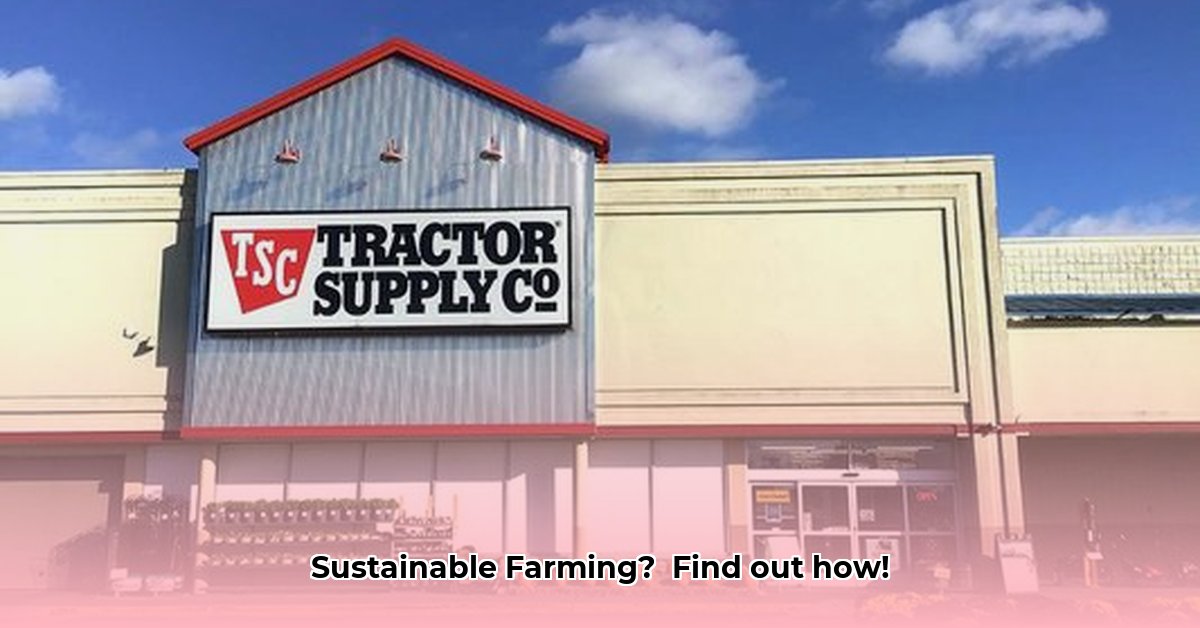
Tractor Supply's Role in Supporting Sustainable Agriculture in North Carolina
Tractor Supply Company (TSC) plays a significant, albeit indirect, role in the sustainability of North Carolina agriculture. For farmers considering new equipment, check out tractor costs. While not directly implementing sustainable practices on farms, TSC provides farmers with the tools and resources to adopt them. This article explores TSC's contribution, highlighting both its strengths and limitations, and offers actionable steps for farmers, TSC, NGOs, and government agencies to foster more sustainable farming practices in the state.
Assessing TSC's Impact on Sustainable Farming
TSC's extensive network of stores offers convenient access to a wide range of agricultural products, from seeds and animal feed to tools and equipment. This accessibility is crucial for smaller farms, enabling efficient farm management. However, TSC's overall impact on sustainability remains unclear. While they offer products capable of supporting eco-friendly practices (e.g., organic seeds), they also sell conventional products like fertilizers and pesticides, making a complete assessment of their environmental footprint challenging. This lack of transparency highlights a crucial area for improvement. Do TSC's sales data reflect a growing trend towards sustainable product choices by North Carolina farmers? This is a question we need answered for a complete picture.
Practical Steps for Farmers to Enhance Farm Sustainability Using TSC Resources
Farmers can actively leverage TSC's resources to implement sustainable practices:
Define Clear Sustainability Goals: Begin by identifying specific, measurable objectives. Are you prioritizing water conservation, reduced chemical use, or improved soil health? These goals will guide your purchasing decisions.
Critically Evaluate TSC's Product Offerings: Research TSC’s catalog, prioritizing organic options and energy-efficient equipment. Actively seek more sustainable alternatives to conventional products. A key question to ask: "Does this product align with my previously defined sustainability goals?"
Engage with TSC Staff: Don't hesitate to engage TSC employees. Ask about organic options, sustainable feed sources, or energy-efficient tools. Their expertise can be invaluable in finding suitable products.
Diversify Your Suppliers: Don't limit yourself to TSC. Explore local suppliers, farmer's co-ops, and online retailers that specialize in sustainable products to maximize your options for achieving your sustainability goals.
Provide Feedback to TSC: Voice your needs to TSC! Contact the store manager or corporate headquarters to express your interest in a broader range of eco-friendly products. Collective farmer feedback can incentivize TSC to adapt its product offerings.
Collaborative Action for a Healthier Agricultural Future
Sustainable agriculture requires a collaborative effort. Consider the following roles:
| Stakeholder | Role in Promoting Sustainable Practices |
|---|---|
| TSC | Expand the availability of organic and sustainable products; enhance supply chain transparency; conduct independent sustainability audits; invest in renewable energy for operations. |
| North Carolina Farmers | Actively utilize sustainable products and practices; participate in educational programs; share experiences and knowledge. |
| Environmental NGOs | Advocate for stricter regulations; provide educational resources; conduct independent assessments of TSC’s environmental impact. |
| Government Agencies | Offer financial incentives and grants; establish regulations limiting harmful chemicals; invest in sustainable technology research. |
Risk Assessment and Mitigation Strategies for Sustainable Farming
Transitioning to sustainable practices involves inherent risks:
| Practice | Potential Challenges | Mitigation Strategies |
|---|---|---|
| Reduced Synthetic Fertilizer | Lower yields initially; nutrient deficiencies; higher organic product costs | Gradual transition; soil testing; cover cropping; crop rotation. |
| Sustainable Livestock Management | Increased disease risk; higher feed costs; reduced productivity | Robust preventative healthcare; diverse and resilient feed sources; improved animal welfare. |
| Renewable Energy Adoption | Higher initial investment; potential reliability issues | Explore government grants and incentives; invest in energy storage; consider hybrid systems; conduct cost-benefit analysis. |
| Integrated Pest Management | Potential for increased pest damage; increased monitoring needs | Thorough pest monitoring and identification; biological control methods; using pesticides only as a last resort. |
Conclusion: Embracing Sustainable Progress
TSC plays a significant role in North Carolina's agricultural landscape. By making informed choices, collaborating effectively, and advocating for improved policies, we can achieve a more sustainable farming future for the state. Remember, the focus is on progressive improvement, not unattainable perfection.
[1] https://newcropsorganics.ces.ncsu.edu/organics/organic-sustainable-agriculture/ (Accessed: 2025-02-24)